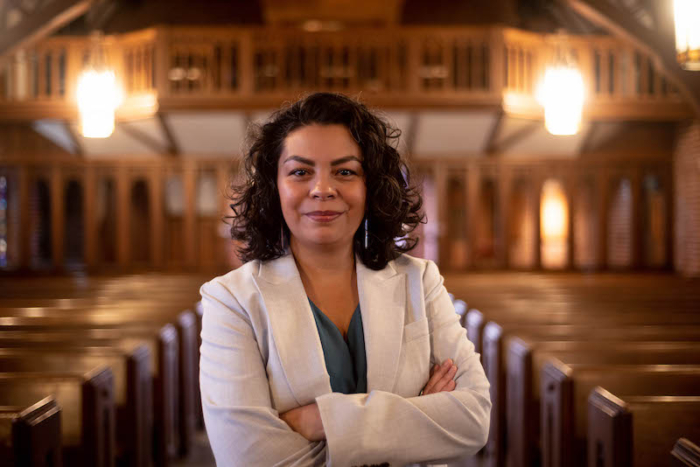Ed: We understand Ayala Harris’ reluctance to name names, but in cases like this, it is essential that we have the courage to identify those responsible.
And while TEC rushes to care for its apparatchiks, we still see a lack of action on The Rev. Richard Loach, now under indictment for raping a child.
We further note that the reference panel in this case dismissed the matter, not a church attorney, contrary to Ayala Harris’ letter.
[Episcopal News Service] Clergy and lay leaders across The Episcopal Church are joining House of Deputies President Julia Ayala Harris in demanding reform of the church’s disciplinary process for bishops as retired Oklahoma Bishop Ed Konieczny was identified as the focus of Ayala Harris’ sexual harassment complaint.
Ayala Harris, in revealing details of her complaint last week, withheld the identity of the bishop who she said had “physically overpowered” her at last year’s 80th General Convention. In an Aug. 30 letter to the House of Deputies, she said felt compelled to go public after her case had ended in a “pastoral response” rather than discipline for the bishop.
The Rt. Rev. Edward J. Konieczny
served as bishop of Oklahoma from 2007 to 2021.
Photo: Diocese of Oklahoma
Konieczny was first identified publicly at the subject of Ayala Harris’ complaint on Sept. 5 in a story by The Living Church, citing three unnamed sources and the Diocese of Oklahoma’s chancellor. Episcopal News Service left messages with the chancellor seeking confirmation but has not yet independently verified the retired bishop’s identity.
When asked to confirm, Ayala Harris referred ENS to her previous response: “Out of the concern for my safety and others, as well as potential legal and privacy issues, I cannot name the respondent bishop at this time.” The Episcopal Church’s Office of Public Affairs cannot comment on Title IV investigations.
Ayala Harris lives in Oklahoma, where she as long served the church as a lay leader and in the House of Deputies. Koniecnzy served as bishop of the Diocese of Oklahoma until he retired in 2021. Ayala Harris and Konieczny served together as members of Executive Council from 2015-2022.
As of midday Sept. 5, more than 240 names had been added to an open letter offering support for Ayala Harris and calling on the House of Bishops to respond to the allegations against one of its members.
Separately, a small group of female bishops from the church’s Province VIII drafted a letter to their peers asking that the issue of bishop accountability be added to the agenda of the House of Bishops’ Sept. 19-12 online meeting. As of Sept. 3, 55 bishops had signed that request, which lamented “several recent high-profile cases in which bishops were accused of improper behavior, and many in the church believe those bishops received few or no consequences.”
“We are angered by and deeply concerned about the perception – or the reality – that bishops get a free pass on behavioral issues,” the bishops said in calling for a formal discussion of the matter. “We want to ensure that in our system, issues like these are taking seriously and treated appropriately. Bishops cannot be allowed to have a ‘free pass.’”
There are at least two Title IV investigations currently pending against Episcopal bishops. In the Diocese of Florida, at least one priest has called for an investigation of Florida Bishop John Howard, who is accused of a pattern and practice of discriminating against LGBTQ+ clergy and those who opposed his stated views against same-sex marriage. And in the dioceses of Eastern Michigan and Western Michigan, the Rt. Rev. Prince Singh, bishop provisional of the both dioceses, welcomed a Title IV probe after his two sons made public accusations accusing their father of a history of physical, verbal and psychological abuse against them and their mother.
The church regularly re-examines its Title IV canons to considers updates. Recent scrutiny of the bishop discipline canons was endorsed by a 2022 resolution passed by the 80th General Convention. It called for a review of the Office of Pastoral Development’s Title IV responsibilities in response to how it handled the suspension of the Rt. Rev. Whayne Hougland Jr., former bishop of the dioceses of Western Michigan and Eastern Michigan, for an extramarital affair. The two dioceses proposed the resolution after describing their experience as “severely lacking in clarity, consistency, timely communication and tracking of our process.” A report from that review and its recommendations won’t be presented until General Convention meets again in 2024.
Ayala Harris said the incident with the retired bishop occurred July 9, 2022, while bishops and deputies were gathered for General Convention in Baltimore, Maryland. She said she had just been elected House of Deputies president and was on her way to appear before the House of Bishops when she “was physically overpowered and lost bodily autonomy by a retired bishop waiting for my arrival.” The bishop also made “inappropriate verbal statements,” she said.
The House of Deputies president submitted a complaint against the bishop through the process outlined in The Episcopal Church’s Title IV canons, with the Office of Pastoral Development serving in the intake role. Another bishop who witnessed the incident also filed a complaint under Title IV.
Title IV canons apply to all clergy. An intake officer determines whether a complainant’s information, if true, would constitute an offence. If so, the next step would be to produce an intake report. In a case involving a bishop, that report is reviewed by the Reference Panel of the Disciplinary Board for Bishops.
The disciplinary board is made up of 18 elected members, a mix of bishops, other clergy and lay leaders, though most of the board’s work is handled by the three people on the Reference Panel: the presiding bishop, the intake officer and the president of the disciplinary board.
The Reference Panel, after reviewing the intake report and potentially gathering additional information has several options, ranging from closing the case with little more than a “pastoral response” to advancing it for consideration of disciplinary action.
It isn’t clear from Ayala Harris’ letter to deputies how far in that process her complaint had advanced. She said the decision to refer it for pastoral response was made by a “church attorney assigned to this matter.”
Alongside the Reference Panel, the canons give significant authority to the designated church attorney in a Title IV case, including “to exercise discretion consistent with this Title and the interests of the Church by declining to advance proceedings” or to send the matter “for pastoral response in lieu of disciplinary action.”
The accused bishop was placed on restricted ministry and removed from certain governance bodies while the complaints were under review, Ayala Harris said. As part of that review, she said, two external investigators produced three reports that concluded the retired bishop likely violated church canons, New York sexual harassment laws and the restriction on his ministry. The review process ended July 31, however, with a referral for “pastoral response” and no disciplinary action against the bishop, an outcome Ayala Harris called “deeply unsettling.”
Ayala Harris said she will push for a new examination of the Title IV canons when the 81st General Convention convenes in June 2024, with an emphasis on “their real-life application to ensure our commitments to safety and accountability, especially in areas where individuals have been given broad discretion with little oversight.”
That push received strong support from the growing list of Episcopalians signing the open letter in response to Ayala Harris’ allegations.
“We are grieved and outraged that on your first day as our elected leader, you were abused by a member of the most privileged class in our church’s hierarchy,” they say in their letter. “We commit to work alongside you to build the safe and life-giving church we all deserve.”
The open letter also applauded the bishops who are calling for accountability. “You now have a choice,” the letter says. “Will you make a strong statement about your commitment to safety for all and your unwavering solidarity with the people of color, women and lay people who regularly experience being ‘put in our place’ when we dare to step into positions of power?”
The letter’s signatories also urged Presiding Bishop Michael Curry to bring “a powerful word” to this issue. “A bland bureaucratic statement will not be enough.”
Curry would have been involved in the handling of Ayala Harris’ complaint but recused himself from the Reference Panel “to protect the integrity of the process” and because of “close professional relationships,” Amanda Skofstad, the church’s public affairs officer, told ENS. Curry asked the Rt. Rev. Dena Harrison, retired Texas suffragan bishop, to serve in his place.
“I want to acknowledge the larger concerns about our mechanisms for accountability and the need to live more fully and effectively into the values of Title IV,” Curry said in a written statement last week to ENS, while noting recent changes in how the church receives initial complaints against bishops. The intake officer for those complaints historically has been the head the Office of Pastoral Development, currently the Rt. Rev. Todd Ousley. In August, the church hired a new staff member to fill that intake role, reporting directly to the president bishop.
On the day Ayala Harris released her letter, six female Province VIII bishops, after discussing it in a private text thread, decided to meet the next day on Zoom to draft a letter to the House of Bishops, according the San Diego Bishop Susan Snook’s account of the discussions in a Facebook post. In addition to Snook, the initial group included El Camino Real Bishop Lucinda Ashby, Nevada Bishop Elizabeth Gardner, Arizona Bishop Jennifer Reddall, Spokane Bishop Gretchen Rehberg and Utah Bishop Phyllis Spiegel.
Snook and the others explained in their Facebook comments that the bishops’ intention was to appeal directly to fellow bishops to raise the issue at their upcoming meeting, not to launch a petition-style signature drive, though dozens of other bishops heard about the letter and asked to sign on. Snook said she decided to post the letter to social media on Sept. 3 after The Living Church published a story Sept. 1 about the bishops’ discussions.
Gardner, in another comment on Snook’s post, acknowledged the pressure for a timely statement from the House of Bishops reacting to Ayala Harris’ letter. “The House isn’t designed to be able to respond with one voice quickly,” Gardner said. “But we don’t want the opportunity to make meaningful change pass us by.”




Leave a Reply